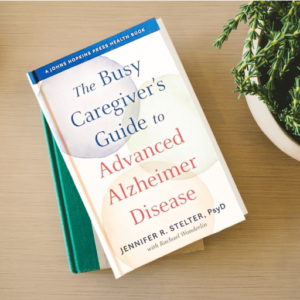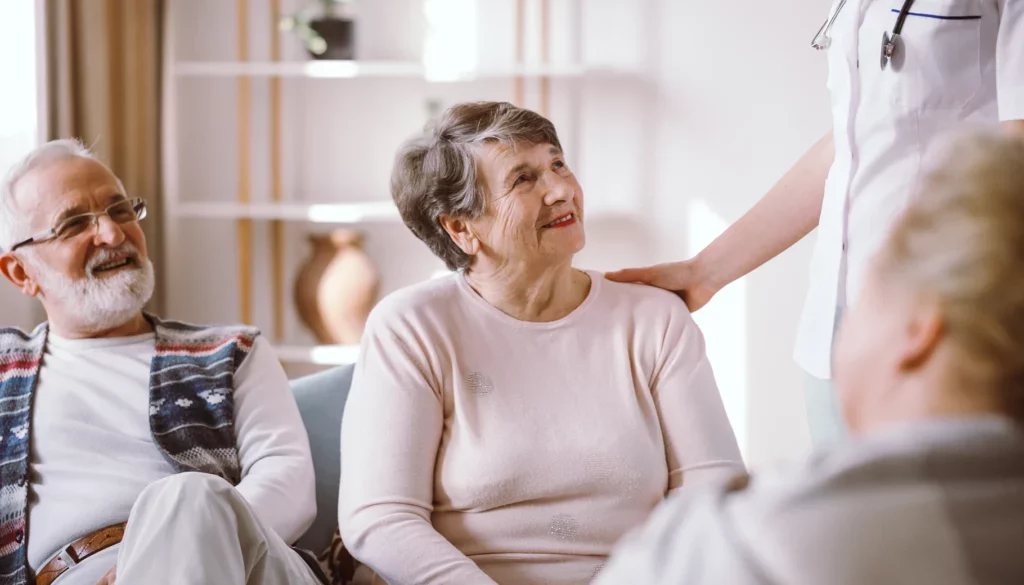Social Prescription in Dementia Care
When we think about how far research has come in dementia care, the unfortunate reality is that there is still no known medicine for it, as well as no cure. We truly think our industry is close. Therefore, the medical model doesn’t work in dementia care. However, we can’t say that there isn’t any treatment available, because we have social prescription. Social prescription is about getting to know the whole person living with dementia, from their preferences in life, roles they’ve been in, understanding what makes them happy and calm, who surrounds them in their life, and their strengths and weaknesses; essentially it’s the essence of who they are. Around 70-75% of a person’s overall health are their social determinants, not their physical or medical health. And several modalities in dementia care have proven positive outcomes by using aspects of social prescription, like the Best Friends™ Approach, Montessori Method, and Validation Therapy. The newest empirically-validated approach upholding social prescription is the Dementia Connection Model©.
The Dementia Connection Model is a cognitive-behavioral framework that takes into account how the person living with dementia is progressing through their disease, focusing on what we know works well with advancing dementia – sensory stimulation. When a person with dementia is stimulated using their senses, that information is processed either directly or indirectly in the limbic system of their brain that houses the amygdala (feelings) and hippocampus (memories). Therefore, positive stimuli should be used to promote positive feelings and memories, this then promotes positive behavioral expressions. And when the caregiver is the one providing these positive experiences, the person with dementia will either connect or re-connect with them because they like how they feel with that person.
The key to this connection is to consistently (i.e., structured, daily) provide these positive experiences in order to reinforce the connection and skills to maintain their highest level of independence for as long as possible (also called habilitation). This is the key to social prescription, utilizing a “prescription” of social determinants when providing good quality care. Within the Dementia Connection Model, the caregiver trials which sensory stimuli are effective, like types of music for auditory stimulation, essential oils for olfactory stimulation, and so on. Then, they determine the frequency and when this will be implemented based on what would be the most beneficial for the person they are caring for. Yes, caregivers should feel free to “prescribe” these interventions to their loved ones or seek assistance with a knowledgeable provider to do so; physicians shouldn’t have to take responsibility for this, although they should be a supporter and contributor.
Within the Dementia Connection Model, comes an approach to care called The Perfect Day™. Each part of the day (i.e., morning, mid-day, afternoon/evening), set sensory stimuli should be used to encourage positive behavioral expressions and minimize sundowning behaviors. These various sensory stimuli include auditory stimulation with music, olfactory stimulation with aromatherapy, tactile stimulation with exercise, pets, dolls, and more, and so on. Let’s dive into the aromatherapy part of The Perfect Day.
Aromatherapy is a relatively safe, all-natural use of essential oils to support one’s health. Although research has shown that a person’s sense of smell may decrease as Alzheimer’s disease progresses, the nose is still an entryway for the sensory stimuli of essential oils because the nasal cavity and nerve cells in the nasal lining are the closest entry to the limbic system. This connection between the sense of smell and the limbic system accounts for the influence of essential oils on mood and memory. Using essential oils can aid in efforts to restore the body back to its natural balance. For example, if you’re feeling sad, they may help you feel content; if you are feeling anxious, they may help you relax. Essential oils can be diffused in the air, placed on stoned jewelry, or applied to pulse points around the neck and wrist areas, like perfume or cologne. Within 20 seconds of inhaling, an essential oil will start to work. And by 30 minutes they have surfaced the whole body. Many clinical trials support the effectiveness of essential oils, including lavender and cedar for reducing anxiety and peppermint for mental stimulation. Essential oils may also be used as part of efforts to stimulate the appetite, help with sleep, increase energy, improve attention and concentration, and much more.
A published review from 2019 provides an excellent summary of studies supporting the therapeutic use of essential oils in people with Alzheimer’s disease specifically. In The Perfect Day method, the prescription recommended to help curb negative behavioral expressions and sundowning includes using peppermint and a citrus scent in the morning. This helps increase mental clarity while improving mood – great for a morning time regimen; citrus additionally increases appetite. At meal times, citrus scents should be used to encourage eating and keep the ‘mood of the room’ elevated. Then, about 30 minutes prior to sundowning and through the afternoon and evening, lavender should be used to promote a sense of calm and encourage sleep. If the person can still smell and they don’t care for the scents being used, then simply try another essential oil that has the same benefits, truly fitting this prescription to the person’s preferences. Now, when this prescription is used daily, there is an immediate effect on promoting positive feelings and behaviors, however, after about four weeks, the person may associate these senses with understanding what time of day it is and what they should be doing, decreasing confusion, loneliness and fear.
It’s important to keep in mind that any substance with a fragrance, including essential oils, may cause an allergic reaction in individuals with sensitivities. Use caution and test a small amount of the oil when introducing it. You will want to consult with your loved one’s health care practitioner and be sure to mention any essential oils and other supplements that you may be using or want to use.
All-in-all, we need to start using social determinants to create prescriptions that we know work for those with dementia. Start this by trying The Perfect Day, using aromatherapy, within the Dementia Connection Model. At the Dementia Connection Institute, we are always striving to educate caregivers and professionals to fill their toolbox with lots of tools to be prepared when caring for those living with dementia. Within social prescription, creating prescriptions using these tools helps when providing care.
For more information on the Dementia Connection Model and much more, go to www.DementiaConnectionInstitute.org. To grab your own ‘The Perfect Day’ aromatherapy kit, go to www.NeuroEssenceOlfactoryToolboxes.com.




